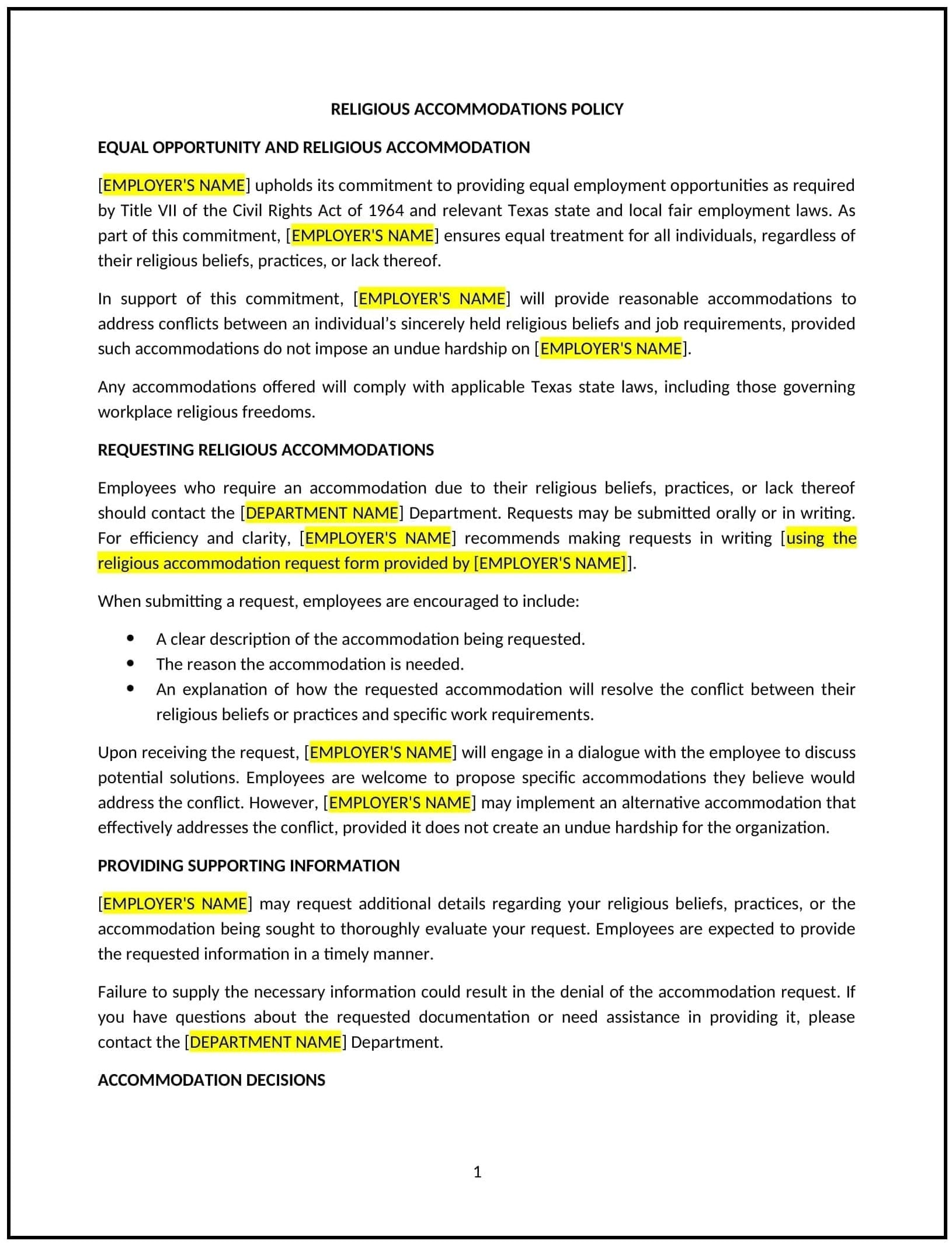Religious accommodations policy (Texas): Free template
Got contracts to review? While you're here for policies, let Cobrief make contract review effortless—start your free review now.

Customize this template for free
Religious accommodations policy (Texas)
This religious accommodations policy is designed to help Texas businesses provide fair and reasonable accommodations for employees’ religious beliefs and practices. The policy outlines how employees can request accommodations for religious observances, including time off for religious holidays, flexible scheduling, dress code modifications, or any other religious practices, while ensuring the company is compliant with Texas state laws and federal regulations, including the Civil Rights Act of 1964.
By adopting this policy, businesses can promote an inclusive and respectful work environment, support employee diversity, and minimize the risk of discrimination claims related to religious practices.
How to use this religious accommodations policy (Texas)
- Define religious accommodations: Clearly explain what religious accommodations are available, such as time off for religious holidays, flexible work hours for prayer or observance, modifications to the dress code, and any other adjustments necessary to respect an employee's religious practices.
- Set the request process: Specify how employees can request religious accommodations, including the notice period required and any documentation that may be needed to support their request. The policy should outline the steps employees must take to formally request accommodations.
- Determine reasonable accommodations: Define what constitutes reasonable accommodations under the policy, including how the company will assess and approve or deny requests. The policy should ensure that accommodations do not create undue hardship on the company’s operations, finances, or safety standards.
- Address conflict resolution: Outline the process for resolving any conflicts related to religious accommodations, including a method for discussing requests with employees and providing alternative solutions if necessary.
- Ensure non-discrimination: Emphasize that the company will not discriminate against employees based on their religion or religious beliefs. The policy should make it clear that employees are entitled to request accommodations without fear of retaliation or adverse treatment.
- Promote inclusivity: Encourage a workplace culture where religious diversity is respected and valued, ensuring that employees feel comfortable discussing their religious needs and practices with HR or management.
Benefits of using this religious accommodations policy (Texas)
This policy offers several benefits for Texas businesses:
- Promotes inclusivity and diversity: By providing accommodations for religious practices, businesses can foster a more inclusive work environment that respects employees’ beliefs, leading to higher employee morale and engagement.
- Reduces discrimination risks: A well-defined religious accommodations policy helps businesses comply with the Civil Rights Act of 1964, reducing the risk of religious discrimination claims or legal action.
- Enhances employee satisfaction: Offering religious accommodations helps employees feel valued and supported, which can improve job satisfaction, retention, and productivity.
- Encourages open communication: The policy encourages open communication between employees and management, allowing for a better understanding of religious needs and providing a process for addressing those needs effectively.
- Strengthens company reputation: Businesses that support religious accommodations demonstrate a commitment to diversity and respect for individual rights, improving their reputation as a fair and ethical employer.
Tips for using this religious accommodations policy (Texas)
- Communicate the policy clearly: Ensure that all employees are aware of the religious accommodations policy and know how to request accommodations. This can be included in the employee handbook or communicated during onboarding.
- Be flexible: Offer flexibility when possible, especially for employees who need to adjust their work schedules or take time off for religious observances.
- Document requests: Keep accurate records of all religious accommodation requests, approvals, and any adjustments made to ensure consistency and to protect the company in case of future disputes.
- Regularly review the policy: Periodically review the policy to ensure it is compliant with Texas state laws, federal regulations, and the company’s operational needs.
- Address conflicts promptly: If conflicts arise regarding religious accommodations, address them promptly and professionally to maintain a positive and inclusive work environment.